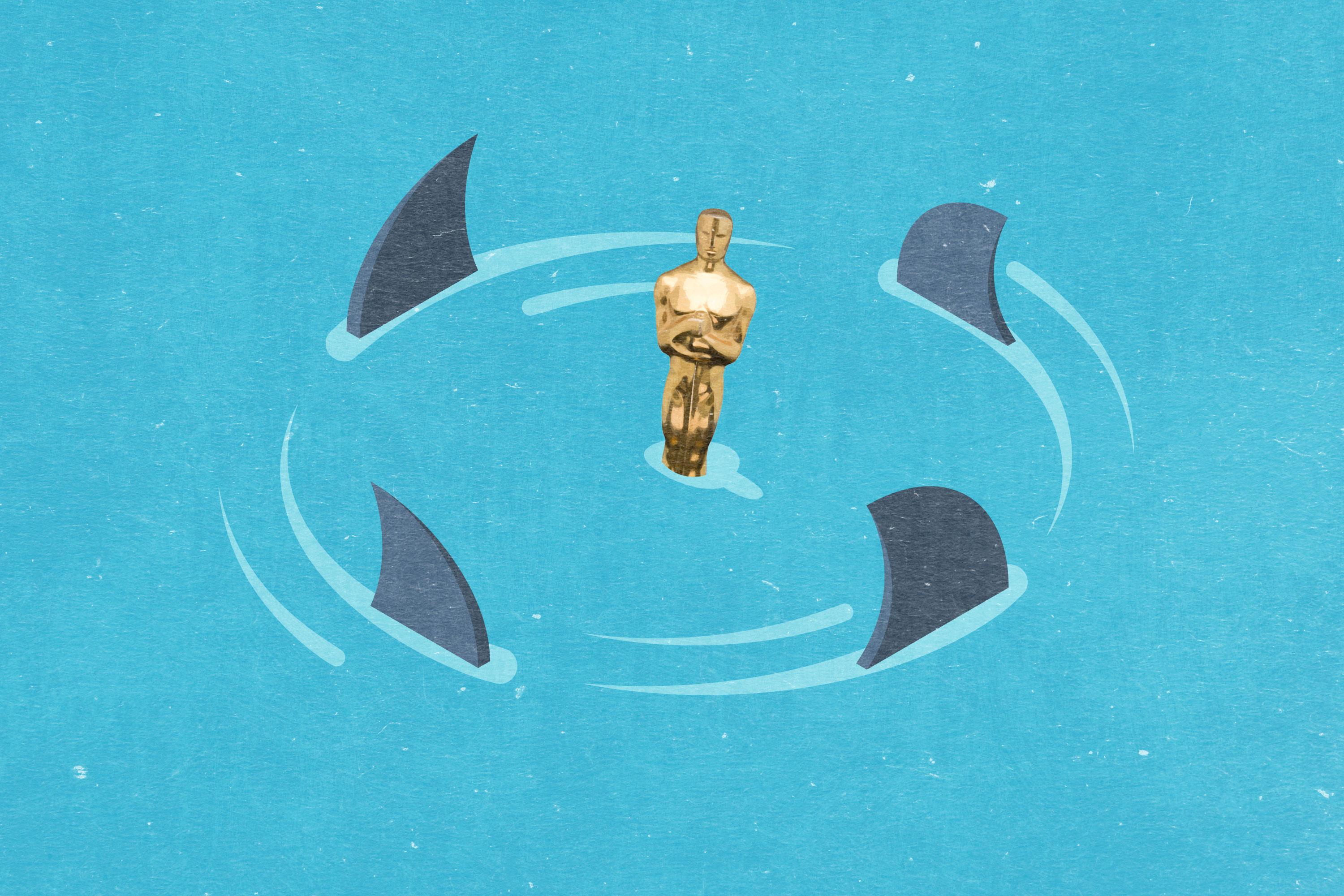
Other than the winners, no one has ever been happy with the Oscars. The awards show exists in that category of life’s unsatisfying constants, like frozen yogurt or M. Night Shyamalan movies. Every year we come back thinking things will have changed, that the Academy of Motion Picture Arts and Sciences will finally get it right. When a film like Moonlight or No Country for Old Men wins Best Picture, hope springs forth. Maybe they’ve got it, we think. But then the next year comes and that old feeling returns. Wrongness is a fundamental aspect of the Academy Awards. Imperfection is a feature, not a bug. And not unlike another historical site of agonized frivolity, the Baseball Hall of Fame, that is one of the things that makes it so vital. Despite its proud history of incorrectness, of everlasting do-overs and make-up calls, the Oscar show is the very best thing of its kind that we’ve got—it’s not only the most entertaining awards show, it’s the only one with a sense of dignity, history, and import. The Oscars are not a permanent record of movie history—they’re a permanent record of the Oscars. But that is inherently valuable. Unlike virtually all of the show’s peers, we remember the results, we track artists’ career trajectories through them, and we squeal over snubs and surprises. For lack of a cleaner emotion, we care. But it feels like that may be changing.
The past six months of attempted Oscars reinvention has been a verifiable disaster. As a response to the show’s plummeting ratings—and the downsloping trendline of viewership across all awards shows, and network television at large—the Academy has sought to sharpen its telecast, to steam out the wrinkles of shows past. The criticisms have ranged widely over the years, from the show’s length, to its infatuated self-love montages, to its harebrained host ideas, to its choice of nominees. In the course of its analysis, it has test-ballooned several ideas, virtually all of which have been scoffed at, raised the hackles of members throughout the industry as well as serious fans of the show, or been outright rejected. The lambasted popular Oscar idea, in particular, met a swift and brutal fate.
This tweet is how the world learned of Academy CEO Dawn Hudson and president John Bailey’s plan to skinny down the show and celebrate “popular” films. Popular films, of course, have as much place at the Oscars as their less commercially successful counterparts—Titanic was the winner at the most watched Oscars in history. But the movie industry has become deeply stratified and Hollywood elders feel suffocated by an increasingly franchise-driven business model. The Oscars have countered that with wins for smaller films in recent years, like The Hurt Locker and Moonlight. Last year’s show, in which Guillermo del Toro’s much admired but only moderately successful film The Shape of Water won Best Picture, was the least watched ever. An ambient panic has set in. There will, of course, not be a popular Oscar at this year’s ceremony. No need: Black Panther, Bohemian Rhapsody, and A Star Is Born sit comfortably among the highest-grossing movies ever nominated for Best Picture.
The popular Oscar proposal ran counter to the philosophical identity of the show, but the changes that have followed have been more concerning. Last summer, reports claimed that several categories would be relegated to commercial breaks during the telecast, to hold the line at a three-hour runtime. That much still appears to be true. Best Cinematography is likely not going to appear on this year’s show, despite Academy president John Bailey being a cinematographer. The Academy says it will rotate which categories air during commercials each year, though it still remains unclear which ones won’t appear this month. I suspect at least one shorts category, something like production design, and maybe even Foreign Language Film, will be pushed.
Is this an outrage? Not exactly, many awards show do this—the Grammys hands out dozens of awards, but only eight or so happen on TV. But the Oscars’ longstanding insistence upon rewarding in categories like Sound Editing and Makeup and Hairstyling and Writing (Adapted Screenplay) is one of its great powers—the persnickety specificity of celebrating the individual craftspeople who add their little wooden block to the soaring Jenga tower of moviemaking provides a portal to the way we understand how movies are made. They aren’t just magic. They’re mechanical and material and handmade.
Removing these awards disappears something unique about the Academy Awards, something vital. They are given out by the people who make the damn things. It’s what separates them from the Golden Globes and the MTV Movie Awards and some guy making a list and yelling about it on a podcast. In fact, sometimes these lesser-known categories elicit the very best moments. Like, say, Pawel Pawlikowski’s acceptance speech after his win in the Foreign Language category in 2015 for his film Ida.
The reception of this news among Oscar-watchers has been negative, bordering on hostile. It’s getting noisier everyday. A hashtag, #PresentAll24, has been created. Voters that I’ve spoken to are either confused or angry. I don’t know anyone who thinks the planned changes have been thoughtfully deployed or carefully messaged. Some nominees are just learning that there have been changes to the telecast. There was an unconfirmed rumor circulating last week that the show had planned to include just two live performances of the five Best Song nominees. The record has been cleared on that—all five performances are set to air. But this A/B testing persists. It’s becoming a familiar refrain: Kevin Hart is in as host. Actually, he’s out. Should we let him back in because we’re desperate and he has a movie to promote? Maybe. Actually, no. OK, the Avengers will host. But wait, can we get them? Maybe no host after all. Yeah, that’s the ticket ...
Last week, it was reported that the four major acting category winners from last year’s ceremony would not be asked to present this year’s winners, as is customary. Instead, figures more famous than Gary Oldman, Frances McDormand, Sam Rockwell, and Allison Janney would hand out those statuettes. Then the Academy responded to that rumor with another vague but cheerily obtuse message.
It’s been a curious dissonance. The Oscars are broken, but we don’t want them to be fixed. They’re a mess, but they’re our mess. The telecast becomes a cultural dartboard almost immediately after the ceremony ends, and yet the sense of ownership that so many feel over it caused The New York Times, in light of so many proposed changes, to ask, “Are the Oscars Ashamed to Be the Oscars?” There’s no question that the Academy Awards should and will continue to evolve. That’s what they’ve been doing for 90 years. Previous president Cheryl Boone Isaacs radically altered the voting body composition during her administration. One of her predecessors, Sid Ganis, expanded the Best Picture nominee pool to 10 films. The first Oscars featured just 12 awards, one of which was Best Title Writing. (Congratulations to Joseph W. Farnum, who won for “No Specific Film.”) Change is essential to this process. A Netflix movie is the odds-on favorite to win Best Picture in 2019. A Marvel movie is in contention. Spike Lee could finally win something. Things change, if slowly. Sweeping, reactionary modification can feel radical, essential even. But when that change is spurred on by fear, it’s no way protect the most valuable party on earth.
Assessed individually, these are small cuts, made in service of a corporate partner (ABC/Disney) and a perception of possible renewal. The desire to shorten the show to three hours is the strangest gambit of them all. The presumption that a shorter show will be more popular is impossible to prove. When Titanic won in 1998, the show ran 3 hours and 47 minutes. Fifty-five million people tuned in. That was 20 years ago, and viewing habits have changed considerably. Half of those 55 million are either dead or will probably be watching Netflix. But what about 2014’s telecast, in which 43 million people watched a 214-minute show to see 12 Years a Slave best Gravity, Captain Phillips, The Wolf of Wall Street, and American Hustle for the top prize? There’s a middle ground, perhaps. More airtime means more awards, more songs, more pomp … and more room for commercials.
Commercials are important. The Oscars are still a significant financial machine for ABC. In case you were wondering what’s driving all this urgency around change, according to Variety:
Commercials tied to the Oscars broadcast and ABC’s red-carpet coverage generated approximately $128 million for the network in 2017, according to Kantar, a tracker of ad spending – more ad revenue than it generates on any other day of the year.
Despite the audience drop, ad costs for the event continue to rise. ABC sought as much as $2.6 million for a 30-second Oscars spot in its 2018 broadcast. The price in recent years had typically hovered at between $1.8 million and $2.2 million.
This isn’t just big business; it’s the biggest in network television. Does the Academy know how full-throated these rejections have been? Given that virtually every time it proposes a change it’s shouted down by people on the internet, one assumes yes. It’s put the show in an inescapable bind. Change and fail and the Oscars will be deemed hopeless. Fail to evolve and risk dying out in the embers of the monoculture’s flame.
These changes represent one more convulsion in an organization that has been trapped in a kind of culture war of its own design. Since Boone Isaacs increased the number of women, people of color, and international members in the Academy, the Oscars have slowly become more diverse, in a series of ways. All kinds of movies are being acknowledged now. But there is still a more than significant percentage of voters born of a different generation or a different mentality about what makes for Oscar-worthy work. Last year, Three Billboards Outside Ebbing, Missouri became the subject of great debate and roiling ire for its unsophisticated portrayal of a racist cop character. It won two Oscars. This year, Green Book and Bohemian Rhapsody have been decried for a litany of on-screen failures and backstage catastrophes. They’re also favorites in major categories. Every year is a showdown, a public battle over the rightness—the justified presence—of films nominated in these categories. Art, on this scale, is measured by decency, by sociological care. It’s a knotty issue. It’s pat to chalk up the difficulties of any artistic endeavor to “these divided times”—but for the Oscars, binaries, raging headlines, and furiously-minded critical analyses feel plainly in keeping with a political climate that rewards boldfaced madness. If Green Book wins Best Picture, the show’s runtime will be merely distant thunder in an acid rainstorm.
The most arch conspiracists have suggested that this is all a fantastical, interest-stoking ruse stirred up by savvy Academy members who know that controversy sells—these are showpeople, after all. I tend to favor the arc of human error and free-floating incompetence when it comes to these sorts of things. It’s unclear how the changes and the anxiety that has accompanied them will play out February 24 and beyond. If one thing is certain, it’s that whatever bad choices are made for that night will resonate throughout the foreseeable future of the Oscars. But unlike the aging actors who wait decades to be recognized for their work, there’s no lifetime achievement award for an awards show. Once the band plays you off, there’s no getting back on stage.

